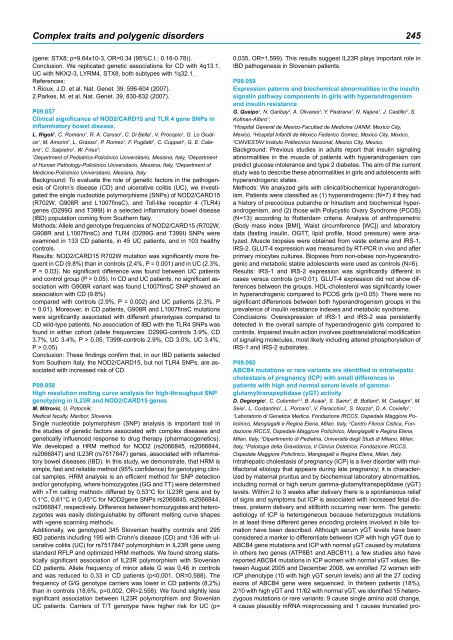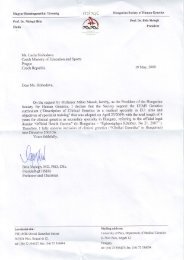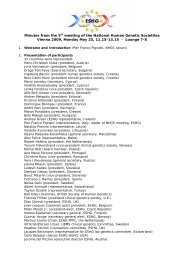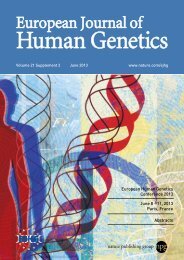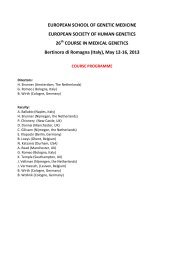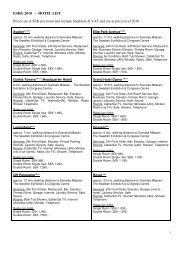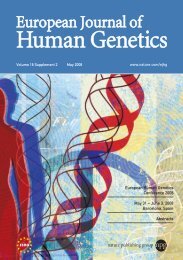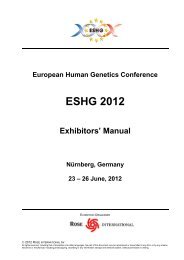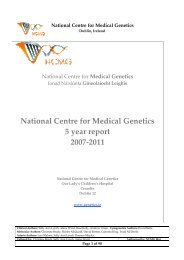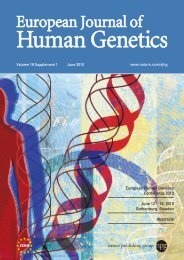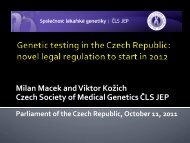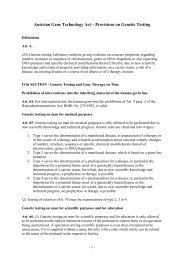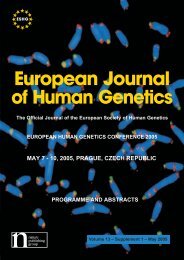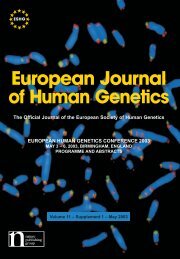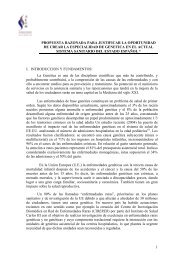- Page 1 and 2:
Volume 17 Supplement 2 May 2009 www
- Page 3 and 4:
European Society of Human Genetics
- Page 5 and 6:
Table of Contents spoken Presentati
- Page 7 and 8:
Plenary Lectures PL2.2 massive para
- Page 9 and 10:
Concurrent Symposia s01.1 Genome va
- Page 11 and 12:
Concurrent Symposia Monogenic diabe
- Page 13 and 14:
Concurrent Symposia invariable in t
- Page 15 and 16:
Concurrent Symposia s11.2 clinical,
- Page 17 and 18:
Concurrent Symposia s13.2 A novel g
- Page 19 and 20:
Concurrent Sessions c01.1 mRNA-seq
- Page 21 and 22:
Concurrent Sessions velopmental del
- Page 23 and 24:
Concurrent Sessions development of
- Page 25 and 26:
Concurrent Sessions c04.6 Duplicati
- Page 27 and 28:
Concurrent Sessions genes to be rec
- Page 29 and 30:
Concurrent Sessions c07.5 Prenatal
- Page 31 and 32:
Concurrent Sessions with familial h
- Page 33 and 34:
Concurrent Sessions University of W
- Page 35 and 36:
Concurrent Sessions with this, we f
- Page 37 and 38:
Concurrent Sessions had immotile ci
- Page 39 and 40:
Concurrent Sessions abnormal glycos
- Page 41 and 42:
Concurrent Sessions showers’ and
- Page 43 and 44:
Concurrent Sessions partial gene de
- Page 45 and 46:
Concurrent Sessions leads to distre
- Page 47 and 48:
Genetic counseling Genetics educati
- Page 49 and 50:
Genetic counseling Genetics educati
- Page 51 and 52:
Genetic counseling Genetics educati
- Page 53 and 54:
Genetic counseling Genetics educati
- Page 55 and 56:
Genetic counseling Genetics educati
- Page 57 and 58:
Genetic counseling Genetics educati
- Page 59 and 60:
Clinical genetics and Dysmorphology
- Page 61 and 62:
Clinical genetics and Dysmorphology
- Page 63 and 64:
Clinical genetics and Dysmorphology
- Page 65 and 66:
Clinical genetics and Dysmorphology
- Page 67 and 68:
Clinical genetics and Dysmorphology
- Page 69 and 70:
Clinical genetics and Dysmorphology
- Page 71 and 72:
Clinical genetics and Dysmorphology
- Page 73 and 74:
Clinical genetics and Dysmorphology
- Page 75 and 76:
Clinical genetics and Dysmorphology
- Page 77 and 78:
Clinical genetics and Dysmorphology
- Page 79 and 80:
Clinical genetics and Dysmorphology
- Page 81 and 82:
Clinical genetics and Dysmorphology
- Page 83 and 84:
Clinical genetics and Dysmorphology
- Page 85 and 86:
Clinical genetics and Dysmorphology
- Page 87 and 88:
Clinical genetics and Dysmorphology
- Page 89 and 90:
Clinical genetics and Dysmorphology
- Page 91 and 92:
Clinical genetics and Dysmorphology
- Page 93 and 94:
Clinical genetics and Dysmorphology
- Page 95 and 96:
Clinical genetics and Dysmorphology
- Page 97 and 98:
Clinical genetics and Dysmorphology
- Page 99 and 100:
Clinical genetics and Dysmorphology
- Page 101 and 102:
Clinical genetics and Dysmorphology
- Page 103 and 104:
Clinical genetics and Dysmorphology
- Page 105 and 106:
Cytogenetics P03. cytogenetics Recu
- Page 107 and 108:
Cytogenetics use of metaphase analy
- Page 109 and 110:
Cytogenetics 2: mother’s age < fa
- Page 111 and 112:
Cytogenetics P03.028 HLA B27 allele
- Page 113 and 114:
Cytogenetics karyotype revealed a p
- Page 115 and 116:
Cytogenetics drome is estimated at
- Page 117 and 118:
Cytogenetics P03.057 Pathological c
- Page 119 and 120:
Cytogenetics grandmother and 2 mate
- Page 121 and 122:
Cytogenetics method used to detect
- Page 123 and 124:
Cytogenetics P03.082 High-resolutio
- Page 125 and 126:
Cytogenetics All detected anomalies
- Page 127 and 128:
Cytogenetics somy for chromosome 2.
- Page 129 and 130:
Cytogenetics cially in chromosome 4
- Page 131 and 132:
Cytogenetics (59.390.122 to 62.021.
- Page 133 and 134:
Cytogenetics For further characteri
- Page 135 and 136:
Cytogenetics 9p duplication. This c
- Page 137 and 138:
Cytogenetics regions with mental /d
- Page 139 and 140:
Cytogenetics donation program of po
- Page 141 and 142:
Cytogenetics P03.165 interpretation
- Page 143 and 144:
Cytogenetics P03.174 Deletion of th
- Page 145 and 146:
Cytogenetics P03.183 An atypical 7q
- Page 147 and 148:
Cytogenetics spermia, 11 oligosperm
- Page 149 and 150:
Reproductive genetics and social fa
- Page 151 and 152:
Reproductive genetics mosomal chang
- Page 153 and 154:
Reproductive genetics two cohorts w
- Page 155 and 156:
Reproductive genetics the 147 SC ch
- Page 157 and 158:
Prenatal and perinatal genetics P05
- Page 159 and 160:
Prenatal and perinatal genetics and
- Page 161 and 162:
Prenatal and perinatal genetics fro
- Page 163 and 164:
Prenatal and perinatal genetics dev
- Page 165 and 166:
Prenatal and perinatal genetics in
- Page 167 and 168:
Prenatal and perinatal genetics obj
- Page 169 and 170:
Prenatal and perinatal genetics P05
- Page 171 and 172:
Cancer genetics P06.005 tiling reso
- Page 173 and 174:
Cancer genetics tient group in whic
- Page 175 and 176:
Cancer genetics chronic inflammatio
- Page 177 and 178:
Cancer genetics licular thyroid can
- Page 179 and 180:
Cancer genetics also studied. In 31
- Page 181 and 182:
Cancer genetics tile polyposis. We
- Page 183 and 184:
Cancer genetics Upon recombinant ex
- Page 185 and 186:
Cancer genetics variant allele was
- Page 187 and 188:
Cancer genetics from patients with
- Page 189 and 190:
Cancer genetics tion (PAX5 and GATA
- Page 191 and 192:
Cancer genetics scribed underexpres
- Page 193 and 194:
Cancer genetics of the ZIC gene fam
- Page 195 and 196:
Cancer genetics Materials and metho
- Page 197 and 198: Cancer genetics the past and it is
- Page 199 and 200: Cancer genetics P06.130 spectrum an
- Page 201 and 202: Cancer genetics P06.139 the role of
- Page 203 and 204: Cancer genetics and MSH2 germline m
- Page 205 and 206: Cancer genetics P06.155 New roles f
- Page 207 and 208: Cancer genetics screening was perfo
- Page 209 and 210: Cancer genetics val (DFI) than pati
- Page 211 and 212: Cancer genetics is hTERC gene ampli
- Page 213 and 214: Cancer genetics on chromosome regio
- Page 215 and 216: Cancer genetics preferentially dupl
- Page 217 and 218: Cancer cytogenetics mutations in co
- Page 219 and 220: Cancer cytogenetics P07.08 molecula
- Page 221 and 222: Statistical genetics, includes Mapp
- Page 223 and 224: Statistical genetics, includes Mapp
- Page 225 and 226: Statistical genetics, includes Mapp
- Page 227 and 228: Statistical genetics, includes Mapp
- Page 229 and 230: Statistical genetics, includes Mapp
- Page 231 and 232: Statistical genetics, includes Mapp
- Page 233 and 234: Statistical genetics, includes Mapp
- Page 235 and 236: Complex traits and polygenic disord
- Page 237 and 238: Complex traits and polygenic disord
- Page 239 and 240: Complex traits and polygenic disord
- Page 241 and 242: Complex traits and polygenic disord
- Page 243 and 244: Complex traits and polygenic disord
- Page 245 and 246: Complex traits and polygenic disord
- Page 247: Complex traits and polygenic disord
- Page 251 and 252: Complex traits and polygenic disord
- Page 253 and 254: Complex traits and polygenic disord
- Page 255 and 256: Complex traits and polygenic disord
- Page 257 and 258: Complex traits and polygenic disord
- Page 259 and 260: Complex traits and polygenic disord
- Page 261 and 262: Complex traits and polygenic disord
- Page 263 and 264: Complex traits and polygenic disord
- Page 265 and 266: Complex traits and polygenic disord
- Page 267 and 268: Evolutionary and population genetic
- Page 269 and 270: Evolutionary and population genetic
- Page 271 and 272: Evolutionary and population genetic
- Page 273 and 274: Evolutionary and population genetic
- Page 275 and 276: Evolutionary and population genetic
- Page 277 and 278: Evolutionary and population genetic
- Page 279 and 280: Evolutionary and population genetic
- Page 281 and 282: Evolutionary and population genetic
- Page 283 and 284: Evolutionary and population genetic
- Page 285 and 286: Genomics, Genomic technology and Ep
- Page 287 and 288: Genomics, Genomic technology and Ep
- Page 289 and 290: Genomics, Genomic technology and Ep
- Page 291 and 292: Genomics, Genomic technology and Ep
- Page 293 and 294: Genomics, Genomic technology and Ep
- Page 295 and 296: Genomics, Genomic technology and Ep
- Page 297 and 298: Genomics, Genomic technology and Ep
- Page 299 and 300:
Genomics, Genomic technology and Ep
- Page 301 and 302:
Genomics, Genomic technology and Ep
- Page 303 and 304:
Genomics, Genomic technology and Ep
- Page 305 and 306:
Genomics, Genomic technology and Ep
- Page 307 and 308:
Genomics, Genomic technology and Ep
- Page 309 and 310:
Genomics, Genomic technology and Ep
- Page 311 and 312:
Genomics, Genomic technology and Ep
- Page 313 and 314:
Molecular basis of Mendelian disord
- Page 315 and 316:
Molecular basis of Mendelian disord
- Page 317 and 318:
Molecular basis of Mendelian disord
- Page 319 and 320:
Molecular basis of Mendelian disord
- Page 321 and 322:
Molecular basis of Mendelian disord
- Page 323 and 324:
Molecular basis of Mendelian disord
- Page 325 and 326:
Molecular basis of Mendelian disord
- Page 327 and 328:
Molecular basis of Mendelian disord
- Page 329 and 330:
Molecular basis of Mendelian disord
- Page 331 and 332:
Molecular basis of Mendelian disord
- Page 333 and 334:
Molecular basis of Mendelian disord
- Page 335 and 336:
Molecular basis of Mendelian disord
- Page 337 and 338:
Molecular basis of Mendelian disord
- Page 339 and 340:
Molecular basis of Mendelian disord
- Page 341 and 342:
Molecular basis of Mendelian disord
- Page 343 and 344:
Molecular basis of Mendelian disord
- Page 345 and 346:
Molecular basis of Mendelian disord
- Page 347 and 348:
Molecular basis of Mendelian disord
- Page 349 and 350:
Molecular basis of Mendelian disord
- Page 351 and 352:
Metabolic disorders P12.167 Pattern
- Page 353 and 354:
Metabolic disorders PKU. BH4 challe
- Page 355 and 356:
Metabolic disorders catepe Universi
- Page 357 and 358:
Metabolic disorders respectively. G
- Page 359 and 360:
Metabolic disorders enzymaticaly co
- Page 361 and 362:
Metabolic disorders Normal Affected
- Page 363 and 364:
Therapy for genetic disorders in th
- Page 365 and 366:
Therapy for genetic disorders P14.0
- Page 367 and 368:
Therapy for genetic disorders of me
- Page 369 and 370:
Laboratory and quality management P
- Page 371 and 372:
Laboratory and quality management T
- Page 373 and 374:
Molecular and biochemical basis of
- Page 375 and 376:
Molecular and biochemical basis of
- Page 377 and 378:
Molecular and biochemical basis of
- Page 379 and 380:
Molecular and biochemical basis of
- Page 381 and 382:
Molecular and biochemical basis of
- Page 383 and 384:
Molecular and biochemical basis of
- Page 385 and 386:
Genetic analysis, linkage ans assoc
- Page 387 and 388:
Genetic analysis, linkage ans assoc
- Page 389 and 390:
Genetic analysis, linkage ans assoc
- Page 391 and 392:
Genetic analysis, linkage ans assoc
- Page 393 and 394:
Genetic analysis, linkage ans assoc
- Page 395 and 396:
Genetic analysis, linkage ans assoc
- Page 397 and 398:
Genetic analysis, linkage ans assoc
- Page 399 and 400:
Genetic analysis, linkage ans assoc
- Page 401 and 402:
Genetic analysis, linkage ans assoc
- Page 403 and 404:
Author Index Allanson, J.: P02.140
- Page 405 and 406:
Author Index 0 Barbacioru, C.: C01.
- Page 407 and 408:
Author Index 0 Bonneau, D.: C16.2,
- Page 409 and 410:
Author Index 0 Chakravarti, A.: C13
- Page 411 and 412:
Author Index 0 Dan, D.: P01.39, P14
- Page 413 and 414:
Author Index 0 Duskova, J.: P06.012
- Page 415 and 416:
Author Index Franke, A.: P09.056 Fr
- Page 417 and 418:
Author Index Grasso, R.: P02.025 Gr
- Page 419 and 420:
Author Index Holder-Espinasse, M.:
- Page 421 and 422:
Author Index Jurkiewicz, E.: C14.5
- Page 423 and 424:
Author Index Kooper, A. J. A.: P05.
- Page 425 and 426:
Author Index Li, K. J.: P11.086 Li,
- Page 427 and 428:
Author Index Martinet, D.: P03.095
- Page 429 and 430:
Author Index Moorman, A. F. M.: P16
- Page 431 and 432:
Author Index P10.57, P10.82 Oguzkan
- Page 433 and 434:
Author Index P09.054, P09.085, P09.
- Page 435 and 436:
Author Index P16.01 Renieri, A.: P0
- Page 437 and 438:
Author Index Santorelli, F.: P08.55
- Page 439 and 440:
Author Index Sinke, R. J.: P02.020
- Page 441 and 442:
Author Index Taheri, M.: P04.33, P0
- Page 443 and 444:
Author Index Valentino, P.: P02.064
- Page 445 and 446:
Author Index Wiemer-Kruel, A.: P14.
- Page 447 and 448:
Keyword Index 1 10q22 deletions: P0
- Page 449 and 450:
Keyword Index autosomal dominant re
- Page 451 and 452:
Keyword Index CLA: P06.073 CLCN1 ge
- Page 453 and 454:
Keyword Index DMD: P16.40, P16.41,
- Page 455 and 456:
Keyword Index gene networks: S12.2
- Page 457 and 458:
Keyword Index hydrocephaly: P05.11
- Page 459 and 460:
Keyword Index malignant hyperthermi
- Page 461 and 462:
Keyword Index NAT2: P12.118 natridi
- Page 463 and 464:
Keyword Index Polymalformations: P0
- Page 465 and 466:
Keyword Index Sardinia: C09.6 Sardi
- Page 467 and 468:
Keyword Index TNFalpha: P08.61, P09
- Page 469:
ican


